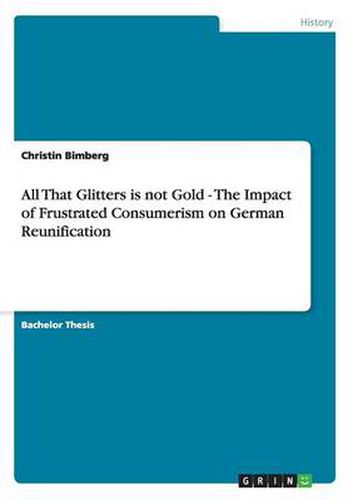Readings Newsletter
Become a Readings Member to make your shopping experience even easier.
Sign in or sign up for free!
You’re not far away from qualifying for FREE standard shipping within Australia
You’ve qualified for FREE standard shipping within Australia
The cart is loading…






Bachelor Thesis from the year 2006 in the subject History Europe - Other Countries - Newer History, European Unification, grade: A, Marshall University, course: History - Senior Seminar, language: English, abstract: Since the beginning of modern nationhood, nationalism has been an important factor in building a nation. According to Ernest Gellner, nations are the artefact of men’s convictions and loyalties and solidarities. Nations are thus of big importance for people’s identity. After World War II, the notion of nationalism became a complicated concept for most Germans. One reason was that people who were nationalistic were condemned by others because of the horrible things done by the Hitler regime. Another complication with post-World War II German nationalism was the division of Germany itself. Due to that division, Germans with the same history and culture were divided by political boundaries. Gellner argues that this harms nationalism immensely. Yet most Germans did not see the division as a permanent condition. The East German attitude in this matter is especially interesting. Despite minor changes in opinion over time, the ordinary East German citizen felt that he or she was part of a single German nation. Actions taken by the East German government aimed at full independence and even isolation from West Germany. However, East Germans did not go along with this. They expressed their desire for a single German nation in many fields, one of them consumer culture. The population did not support the official policy of rejecting and ignoring West German and other products but wanted to be able to enjoy the Western lifestyle. This frustrated desire combined with the shortcomings of production and supply in the GDR was the final problem that, apart from the breakdown of the Soviet Union and the East German economy, led to the eventual collapse of the German Democratic Republic.
$9.00 standard shipping within Australia
FREE standard shipping within Australia for orders over $100.00
Express & International shipping calculated at checkout
Bachelor Thesis from the year 2006 in the subject History Europe - Other Countries - Newer History, European Unification, grade: A, Marshall University, course: History - Senior Seminar, language: English, abstract: Since the beginning of modern nationhood, nationalism has been an important factor in building a nation. According to Ernest Gellner, nations are the artefact of men’s convictions and loyalties and solidarities. Nations are thus of big importance for people’s identity. After World War II, the notion of nationalism became a complicated concept for most Germans. One reason was that people who were nationalistic were condemned by others because of the horrible things done by the Hitler regime. Another complication with post-World War II German nationalism was the division of Germany itself. Due to that division, Germans with the same history and culture were divided by political boundaries. Gellner argues that this harms nationalism immensely. Yet most Germans did not see the division as a permanent condition. The East German attitude in this matter is especially interesting. Despite minor changes in opinion over time, the ordinary East German citizen felt that he or she was part of a single German nation. Actions taken by the East German government aimed at full independence and even isolation from West Germany. However, East Germans did not go along with this. They expressed their desire for a single German nation in many fields, one of them consumer culture. The population did not support the official policy of rejecting and ignoring West German and other products but wanted to be able to enjoy the Western lifestyle. This frustrated desire combined with the shortcomings of production and supply in the GDR was the final problem that, apart from the breakdown of the Soviet Union and the East German economy, led to the eventual collapse of the German Democratic Republic.